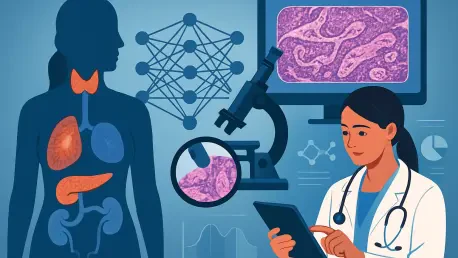In a remarkable breakthrough for medical diagnostics, a novel artificial intelligence (AI) application has emerged, promising to revolutionize how endocrine cancers are detected and diagnosed worldwide. By utilizing advanced AI capabilities, this tool offers unmatched accuracy and accessibility, bringing expert-level diagnosis to virtually any device connected to the internet. The significance of this innovation lies in its potential to transform the landscape of cancer diagnostics, bridging the gap between resource-rich and resource-limited settings. This cutting-edge application stands out not only for its precision but also for its accessibility, making it a landmark development in the fight against cancers of the thyroid, ovary, pancreas, pituitary, and adrenal glands.
Advanced AI Applications in Cancer Diagnostics
Presented at ENDO 2025, the annual meeting of the Endocrine Society in San Francisco, this groundbreaking AI was spearheaded by Jansi Rani Sethuraj from the University of Texas Health Science Center. It leverages advanced deep learning architectures like EfficientNet and ResNet, enabling it to efficiently analyze complex medical data such as CT scans, MRI scans, ultrasonography, and histopathology images. The comprehensive and rapid analysis capacity of this AI tool positions it as a vital asset in accurately diagnosing endocrine cancers. These deep learning models allow for meticulous examination of medical images, providing a level of diagnostic precision that is difficult for traditional methods to match.
The challenge in diagnosing endocrine cancers lies in their complex hormonal effects, which often lead to intricate diagnostic profiles. According to the World Health Organization, approximately 10 million cancer-related deaths occur annually, underlining the urgent need for updated and scalable diagnostic solutions. The AI tool adeptly addresses this need, offering a solution that is not only highly accurate but easily accessible to a broad range of users. Its introduction could potentially change the global approach to endocrine cancer diagnosis, providing a new avenue for healthcare systems worldwide to explore.
Accuracy and Global Impact
Recent studies have illuminated the potential of AI in achieving high diagnostic accuracy for endocrine tumors. This new application has demonstrated exceptional performance, reportedly achieving over 99% accuracy in diagnosing various endocrine cancers across specific validation datasets. Such impressive results indicate a potential shift from traditional diagnostic methods to more modern AI-driven solutions in cancer care. It must be noted, however, that while validation datasets provide evidence of accuracy, real-world performance could present different challenges.
Integral to the development of the AI application were Ramya Elangovan and Kavin Elangovan of AIM Doctor in Houston, Texas. They painstakingly curated anonymized image datasets of endocrine cancers from around the world, encompassing diverse populations from six continents. The extensive dataset collection was critical in training and validating the deep learning models used by the AI, ensuring its accuracy in detecting and staging several types of endocrine cancers. These data-driven insights offer a comprehensive foundation for AI to deliver reliable diagnostic results, enhancing precision in cancer care globally.
Accessibility and Usability
The development of AI in cancer diagnosis underscores the importance of accessibility and usability in medical tools. This application has been independently evaluated by healthcare professionals from various international institutions, confirming its potential for global application. Importantly, the AI tool is designed for efficiency, analyzing images at remarkable speeds. It completes processing in under a second, even on devices with limited computational resources. This feature enables its use in resource-limited settings, where access to advanced diagnostics is often constrained. By offering rapid and reliable diagnostic analysis, the tool empowers healthcare providers to make informed decisions, thus improving patient outcomes significantly.
The implications of this AI-powered tool are profound, spanning numerous aspects of healthcare delivery. It allows clinicians and primary care providers to access expert-level diagnostic insights from virtually anywhere in the world. Such convenience is especially critical in under-resourced regions where conventional diagnostic tools are scarce. For patients, this translates to fewer diagnostic errors, faster treatment decisions, and improved care outcomes. This level of diagnostic support has the potential to transform patient experiences, providing a critical lifeline in areas where access to healthcare professionals is limited.
Future Prospects and Considerations
In a groundbreaking development for medical diagnostics, a new artificial intelligence (AI) tool has emerged, offering an innovative approach to the detection and diagnosis of endocrine cancers. This advanced AI application promises to revolutionize the global landscape of cancer diagnostics with its extraordinary precision and wide-ranging accessibility. Using sophisticated AI techniques, it delivers expert-level cancer detection to any internet-connected device, removing barriers between well-resourced and underserved areas. The importance of this innovation is its potential to transform the diagnostic process, bringing high-level capability universally. This cutting-edge tool is noteworthy not only for its accuracy but also its reach, marking a significant stride in combating cancers related to the thyroid, ovaries, pancreas, pituitary, and adrenal glands. As technology advances, such applications become vital in providing equitable healthcare solutions across diverse regions, bringing hope in the fight against pervasive diseases.









